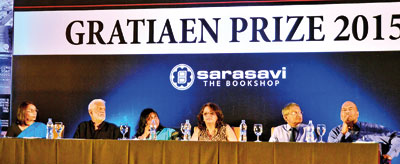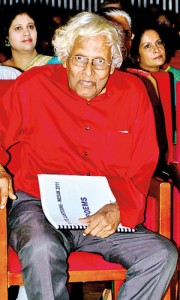Exciting range , vision and ambition at this year’s Gratiaen: Judges

The panel of judges and Gratiaen trustees. Pix by M.A. Pushpa Kumara
Over the past two decades, the Gratiaen Prize has evolved to become a firm fixture in the Sri Lankan literary calendar, ensuring the continuation of Sri Lankan writing in English.
This year, Thiyagaraja Arasanayagam won the 2015 Gratiaen Prize for ‘White Lanterns: Wesak 2011’, a manuscript of unpublished poetry. Based in Kandy, Thiyagaraja Arasanayagam is a teacher of English literature and a past winner of the State Literary Award for the best original play script in English for his play “The Intruder”. He was also previously shortlisted for the 2009 Gratiaen for his poetry collection, “The Singing of the Angels”.
Nominees for the 23rd edition of the Gratiaen Prize were chosen from over 50 submissions. This year’s shortlist included Ashok Ferrey for his novel, ‘Ceaseless Chatter of Demons’, Shehan Karunatilaka for his unpublished novel ‘Devil Dance’, Chammi Rajapathirana for ‘Traveller’s Tales’ – a published memoir of the author’s journey with autism, Grace Wickremasinghe’s unpublished collection of poetry ‘Closure’ and Arasanayagam, himself.
The judges noted that White Lanterns: Wesak 2011 read like a “twilight elegy” and a “requiem for an island, written with love and born of loss”. Tethered to nostalgia and heartbreak, the collection of poems used language sparingly, eloquent and evocative in its brevity. “Tender at its core, White Lanterns: Wesak 2011 speaks of regret, rage, fear, shame, and impunity with a simplicity that belies the skill with which the poet has crafted these testaments to some of the darkest moments in our recent, shared history,” observed the judges at the shortlisting ceremony held last month.
This year’s judging panel consisted of Captain Elmo Jayawardena (Chair), Tracy Holsinger and Dr. Dinali Devendra. The judges commented on the exciting range, vision and ambition of the entries submitted for the prize which reflected the promise of the industry. In an email to the Sunday Times, Capt. Elmo Jayawardena (Chair), noted that it was a close race both to the shortlist and to the winner of the prize, and the decision was made unanimously after much deliberation.

The Gratiaen Prize accepts creative writing spanning a multiplicity of genres – from memoir, poetry, screenplays to fiction. Given the inability to define literary criteria when several genres are pitted against each other, the judges noted that they approached the entries from the perspective of interested readers. Keeping an eye out for fresh insights and captivating narratives, the panel let the criteria evolve as they made the final cut for the prize. A cautionary note was also made about the pitfalls of prematurely self-publishing if a writer is serious about pursuing a literary career and the importance of having an editor appraise one’s work.
This year’s Gratiaen award was brought to life with the Gratiaen Trust’s new partnership with Sarasavi Bookshops. In an effort to encourage Sri Lankan writing in English and in addition to their sponsorship of the event, Sarasavi also pledged their commitment to publish the winning Gratiaen entry, if the author is not committed to another publisher and would like see their manuscript in print.
Perhaps one of the more poignant notes of the evening was the special acknowledgement made of shortlisted author, Chammi Rajapathirana, for his honest and insightful work on living with autism.
The Gratiaen Prize was founded in 1993 by Sri Lankan-born writer Michael Ondaatje with the prize money received as joint-winner of the Booker Prize for The English Patient. The award which recognizes creative writing in English by a Sri Lankan resident, comes with prize money of Rs. 200, 000 and accepts published works and unpublished manuscripts.
Winner of Gratiaen Prize 2015 — Thiyagaraja Arasanayagam  Getting it off his chest: Thiyagaraja Arasanayagam Writing on whatever he can lay his hands on We’d like to hear about White Lanterns: Wesak 2011 in your own words, please. What prompted it and what is it about? How long did it take to write? ‘White Lanterns: Wesak 2011’ is the sum total of my being, my mind, my heart – you may say it is the culmination of many years of suffering of the soul – suffering, I mean experiencing all that society bestows on you, the bestiality, the brutality, the impunity, the sadness, the violence of ethnicity, of war, the sadness of exploitation of the weak, the children, women and the interminable poverty for which no one seems to want to find a solution. “White Lanterns” was prompted by the effect of what I see around me and have experienced. I had to get it off my chest, it had a corrosive effect on my soul, I could no longer hold down the explosive rage at what was happening around me. I have no idea when the idea of a poem germinated and how long a poem takes to write. There is first the incubus, the sparking off of an idea, and then the idea begins to take shape. If you want to be a good poet you must have to be a most dissatisfied character with not only the world you live in, but also with your own work, that with the way you want to scream out your own protest, which means you should be the most painful perfectionist in your own work. This is what in artistic terminology we refer to as “crafting” and “re-crafting”. “Re-crafting” is also called “honing”, shaping, being conscious of form, of sound, of rhythm, of tone and effect of words, in the innumerable ways a collection of words can be patterned, places in multivarious combinations to convey tone, feeling and meaning. If you visited my home you learn that poetry is not written on set forms of books, paper etc. I write on anything that I can lay my hands on, it may be the back of a book, a piece of cardboard or an old diary or even the back of a calendar. My living area is strewn with these pieces scribbled on which will ultimately find their way to some form of poetry. You might ask me why not sit at a desk and write on a specific exercise book or writing pad – this is because ideas, the very germs of poetry that appear in my mind, could vaporize and be lost if I didn’t capture it onto a piece of paper immediately. It’s later that I begin the process of shaping, re-casting and crafting my poem, the word order, the rhyming, the sound effects, the flow of metres, all these that things that go to the poem a meaningful aesthetic experience. I like what Shelley refers to as “the harmonious madness” of his poetry and also when Hopkins tells us to “listen to the music of my poetry”. Words have not only “meaning” but also touch our senses by their “sound” which will ultimately go to make a meaningful experience in the deep recess of our minds. What does winning the Gratiaen mean to you? Winning the Gratiaen has a special meaning to me. Suddenly I feel there is some meaning to what I have been doing. The recognition that was cast on me has become the turning point of my life. What Michael Ondaatje has done for the writers of Sri Lanka is unimaginable. The great generosity of establishing the Gratiaen Trust has given many a writer the encouragement and inspiration to carry on his creative work. I write not only poetry but have published drama and fiction. Now I am encouraged to pull out those innumerable manuscripts in the different genres and to publish them. My recognition as an outstanding writer has given me the much needed confidence that every writer seeks. As a writer and teacher of English Literature, what is it that draws you to poetry as a genre? I am an artist – I was originally a painter. My wife and I were painters and this brought us together. Being a creative artist writing poetry was a natural step. I write not only poetry, but fiction and drama as well. My collection of short stories was shortlisted in 2009. What draws me to poetry as a genre is my complete involvement in art and literature over the greater part of my life. I belong to the era of the English educated when there was no swabasha or Sinhala only education. Being tutored by the great teachers of St. Joseph’s College, like J.P. de Fonseka, poet, writer and a colleague of Hillaire Belloc and G.K. Chesterton and many other great teachers who drew us to literature and the love for the Arts. English literature is a natural part of my life and so poetry is one genre which has drawn me to it.
|


